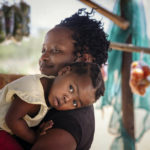Over the past two decades, important progress has been made in implementing services to prevent mother-to-child (vertical) transmission of HIV and expanding access to and uptake of HIV testing for infants and children in countries with a high HIV burden. During the period of upscaling, however, many children living with HIV did not receive HIV testing, and gaps remain in efforts to test all HIV-exposed infants and children.
A new study by CUNY SPH Assistant Professor Chloe Teasdale, doctoral candidate Rebecca Zimba, and colleagues from ICAP at Columbia University provides the first national estimates of the prevalence of undiagnosed HIV in children based on population-level data from sub-Saharan Africa. The findings were published Tuesday in The Lancet HIV.
Using data from the Population-based HIV Impact Assessment (PHIA) surveys conducted in Eswatini, Lesotho, Malawi, Namibia, Tanzania, Zambia, and Zimbabwe from 2015 to 2017, the researchers estimated that close to 40 percent of children aged 1–14 years of age who are living with HIV across these seven countries were undiagnosed, amounting to 166,000 children living with HIV who were not diagnosed or on antiretroviral therapy (ART). They found that, among all children living with HIV in the seven countries, only 55 percent were on ART and only 33 percent had a suppressed viral load. There was substantial variation by country in the prevalence of undiagnosed HIV and pediatric ART coverage, and the authors found that the countries with the highest prevalence of missed diagnosis also had the lowest ART coverage among all children living with HIV.
The findings underscore the urgent need to accelerate HIV testing in order to identify undiagnosed children living with HIV and to ensure that they initiate treatment. This is extremely important as children living with HIV who are not on ART face high risk of mortality. Unfortunately, children continue lag behind adults in treatment coverage, currently only about half of children living with HIV are on ART. To address the treatment gap in children, we must improve pediatric testing coverage, Teasdale says.
“While we know that we are falling short of providing treatment for all children living with HIV, an unknown aspect of the pediatric treatment gap has been an understanding of how many children are not on ART because they have never been diagnosed,” she explains. “The PHIA data provided an opportunity to quantify the proportion of undiagnosed HIV infections in children which has been a missing piece of the puzzle. These data are a call to action. We must do more to identify children living with HIV and to ensure that they start treatment immediately.”
“Estimates of the prevalence of undiagnosed HIV among children living with HIV in Eswatini, Lesotho, Malawi, Namibia, Tanzania, Zambia, and Zimbabwe from 2015 to 2017: an analysis of data from the cross-sectional Population-based HIV Impact Assessment surveys,” Chloe A. Teasdale, Rebecca Zimba, Elaine J. Abrams, Karampreet Sachathep, Felix Ndagije, Harriet Nuwagaba-Biribonwoha, Godfrey Musuka, Owen Mugurungi, Limpho Maile, Mary Mahy, Andrea Low, The Lancet HIV, Volume 9, Issue 2, 2022, Pages e91-e101, ISSN 2352-3018.
About the Institute for Implementation Science in Population Health at the City University of New York The CUNY Institute for Implementation Science in Population Health (ISPH) was founded on the notion that substantial improvements in population health can be efficiently achieved through better implementation of existing strategies, policies, and interventions across multiple sectors. We study how to translate and scale-up evidence-based interventions and policies within clinical and community settings in order to improve population health and reduce health disparities. CUNY ISPH. Pursuing population health gains through better implementation. www.cunyisph.org. Follow us on Twitter: @CUNYISPH.
About the CUNY Graduate School of Public Health and Health Policy The CUNY Graduate School of Public Health and Health Policy (CUNY SPH) is committed to promoting and sustaining healthier populations in New York City and around the world through excellence in education, research, and service in public health and by advocating for sound policy and practice to advance social justice and improve health outcomes for all. For more information, visit sph.cuny.edu.
Media contact:
Ariana Costakes
Communications Editorial Manager
[email protected]
